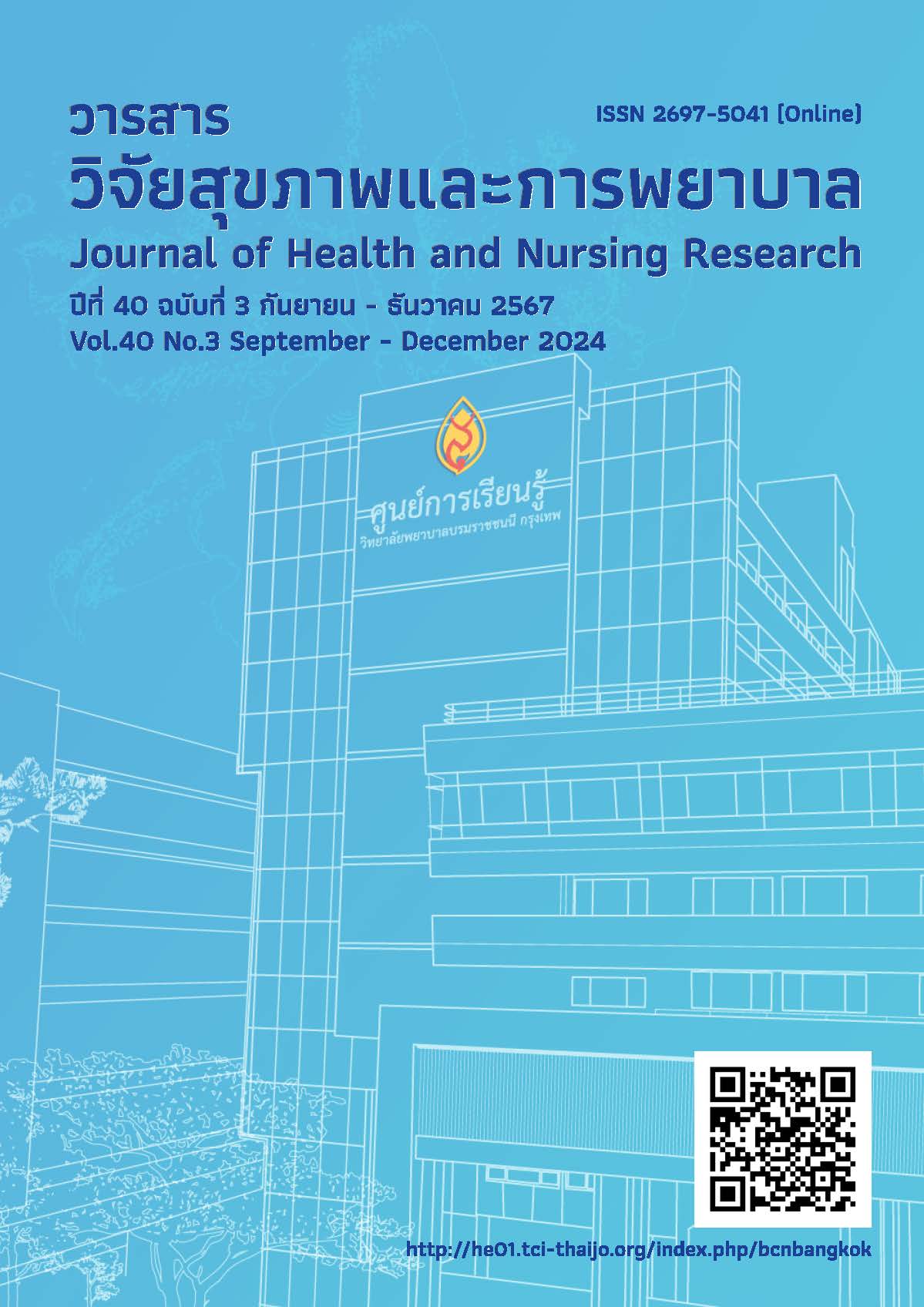ปัจจัยทำนายพฤติกรรมการทำงานที่เน้นนวัตกรรมของพยาบาลวิชาชีพ โรงพยาบาลมหาวิทยาลัยของรัฐ
คำสำคัญ:
พฤติกรรมการทำงานที่เน้นนนวัตกรรม, การเรียนรู้ตลอดชีวิต, ภาวะผู้นำเชิงนวัตกรรม, บรรยากาศการส่งเสริมนวัตกรรมในองค์การ, พยาบาลวิชาชีพ, โรงพยาบาลมหาวิทยาลัยของรัฐบทคัดย่อ
บทนำ: โรงพยาบาลมหาวิทยาลัยของรัฐในประเทศไทยได้เผชิญความท้าทายในการยกระดับคุณภาพการให้บริการท่ามกลางการเปลี่ยนแปลงของเทคโนโลยีและนวัตกรรม การส่งเสริมพฤติกรรมการทำงานที่เน้นนวัตกรรมของพยาบาลวิชาชีพจึงมีความสำคัญ เพื่อช่วยเพิ่มประสิทธิภาพการบริการ คุณภาพการดูแลผู้ป่วย และเสริมสร้างความสามารถในการแข่งขันขององค์กร
วัตถุประสงค์การวิจัย: เพื่อศึกษาปัจจัยที่ร่วมทำนายพฤติกรรมการทำงานที่เน้นนวัตกรรมของพยาบาลวิชาชีพโรงพยาบาลมหาวิทยาลัยของรัฐ
ระเบียบวิธีวิจัย: การศึกษาความสัมพันธ์เชิงทำนาย กลุ่มตัวอย่าง คือ พยาบาลวิชาชีพ จำนวน 210 คน ที่ปฏิบัติงานในโรงพยาบาลมหาวิทยาลัยของรัฐ 3 แห่ง เก็บข้อมูลออนไลน์ผ่านทาง Google form โดยใช้แบบสอบถามการเรียนรู้ตลอดชีวิต แบบสอบถามภาวะผู้นำเชิงนวัตกรรม แบบสอบถามบรรยากาศการส่งเสริมนวัตกรรมในองค์การ และแบบสอบถามพฤติกรรมการทำงานที่เน้นนวัตกรรม มีค่าความตรงเชิงเนื้อหา (CVI = .88 - .94) และความเที่ยง (α = .88 - .97) วิเคราะห์ข้อมูลด้วยสถิติเชิงพรรณนา สถิติสหสัมพันธ์เพียร์สัน และสถิติถดถอยพหุคูณ
ผลการวิจัย: พฤติกรรมการทำงานที่เน้นนวัตกรรมของพยาบาลวิชาชีพ โรงพยาบาลมหาวิทยาลัยของรัฐ โดยรวมอยู่ในระดับปานกลาง (M = 3.49, SD = .76) การเรียนรู้ตลอดชีวิต ภาวะผู้นำเชิงนวัตกรรม และบรรยากาศการส่งเสริมนวัตกรรมในองค์การมีความสัมพันธ์ทางบวกกับพฤติกรรมการทำงานที่เน้นนวัตกรรม (r = .683, .524 และ .499 ตามลำดับ, p < .05) และการวิเคราะห์ถดถอยพหุคูณ พบว่าปัจจัยทั้งสามสามารถร่วมกันทำนายพฤติกรรมการทำงานที่เน้นนวัตกรรมได้ร้อยละ 54.30 (R² = .543, p < .05)
สรุปผล: การเรียนรู้ตลอดชีวิต ภาวะผู้นำเชิงนวัตกรรม และบรรยากาศการส่งเสริมนวัตกรรมในองค์การมีผลต่อการเกิดพฤติกรรมการทำงานที่เน้นนวัตกรรมของพยาบาลวิชาชีพ
ข้อเสนอแนะ: การวิจัยนี้จะเป็นข้อมูลสำหรับผู้บริหารทางการพยาบาลในการกำหนดนโยบายและจัดโครงการส่งเสริมให้พยาบาลมีพฤติกรรมการทำงานที่เน้นนวัตกรรมเพิ่มขึ้น
Downloads
เอกสารอ้างอิง
Kittiban K, Cheevakasemsook A, Phuangsomjit C. Occupational fatigue management in professional nurses at Phra Nakhon Si Ayutthaya Hospital. Thai Journal of Cardio-Thoracic Nursing 2021;32(1):121-36. (in Thai)
Jong JD, Hartog DD. Measuring innovative work behaviour.Creativity Innovation Management 2010;19(1):23-36.
Atalla ADG, El-Ashry AM, Mohamed SMS. The moderating role of ethical awareness in the relationship between nurses’ artificial intelligence perceptions, attitudes, and innovative work behavior: a cross-sectional study. BMC Nursing 2024;23(488):1-11.
Fu L, Xie Y, Zhu Y, Zhang C, Ge Y. Innovative behavior profile and its associated factors among nurses in China: a cross-sectional study based on latent profile analysis. BMJ 2024;14:1-14.
Thanomsaksri N. Factors influencing innovation performance in nursing organizations as perceived by head nurses of community hospitals under the ministry of public health [dissertation]. Nakhon Pathom: Christian University; 2019. (in Thai)
Kitsahawong B, Singchungchai P, Sritoomma, N. The development of an innovation work behavior scale for first-line nurse managers in private hospitals. Nursing Research and Innovation Journal 2020;26(2):203-16. (in Thai)
Cheunbun Y. Skill enhancement in developing innovation for nursing students at the faculty of nursing at the Praboromarajchanok institute [dissertation]. Bangkok: Srinakharinwirot University; 2022. (in Thai)
Riza MF, Nimran U, Musadieq MA, Utami HN. The effect of innovative leadership and creative leadership to organizational learning, organizational adaptation and adaptive performance. Journal of Public Administration Studies 2020;5(2):51-5.
Thato R. Nursing research: concepts to application. 6th ed. Bangkok: Chulalongkorn University Press; 2022. (in Thai)
Wattana P. Relationships between transformational leadership of the head nurses, lifelong learning, job performance of professional nurses, private hospitals, Bangkok metropolis [Master's thesis]. Bangkok: Chulalongkorn University; 2008.
Buachu T. Innovative leadership of head nurses, governmental university hospitals [Master's thesis]. Chulalongkorn University; 2016.
Scott SG, Bruce RA. Determinants of innovative behavior: a path model of individual innovation in the workplace. The Academy of Management Journal 1994;37(3):580-607.
Deci EL, Ryan RM. The "what" and "why" of goal pursuits: human needs and the self-determination of behavior. Psychological Inquiry. 2000;11(4):227-68.
Doramarn N, Malakul Na Ayudhaya P, Kirdpitak P. An experiential learning and critical reflection. Kasem Bundit University Journal of Psychology 2020;10(2):20-8. (in Thai)
Erdoğan DG, Ayanoğlu C. The examination of relationship between lifelong learning trends of school administrators and teachers, and their innovative and entrepreneurial behavior levels. International Journal of Progressive Education 2021;17(2):331-51.
Bass BM, Riggio RE. Transformational leadership. 2nd ed. New York: Lawrence Erlbaum Associates; 2006.
Lewin K. Principles of topological psychology. New York: McGraw-Hill Book Company; 1936.
Makaew P. The Relationship between organizational innovation climate and innovative work behavior of Thai commercial bank employees: the mediating role of harmonious work passion [Master's thesis]. Bangkok: National Institute of Development Administration; 2021.
Brandon AF, All AC. Constructivism theory analysis and application to curricula. Nursing Education Perspective 2010;31(2):89-92.
Cameron KS, Quinn RE. Diagnosing and changing organizational culture: Based on the competing values framework. 3rd ed. Jossey-Bass; 2011.
ดาวน์โหลด
เผยแพร่แล้ว
รูปแบบการอ้างอิง
ฉบับ
ประเภทบทความ
สัญญาอนุญาต
ลิขสิทธิ์ (c) 2024 วารสารวิจัยสุขภาพและการพยาบาล (วารสารวิทยาลัยพยาบาลบรมราชชนนี กรุงเทพ)

อนุญาตภายใต้เงื่อนไข Creative Commons Attribution-NonCommercial 4.0 International License.
บทความที่ได้รับการตีพิมพ์ เป็นลิขสิทธิ์ของวารสารวิจัยสุขภาพและการพยาบาล (วิทยาลัยพยาบาลบรมราชชนนี กรุงเทพ) ไม่สามารถนำไปตีพิมพ์ซ้ำในวารสารฉบับอื่น


















